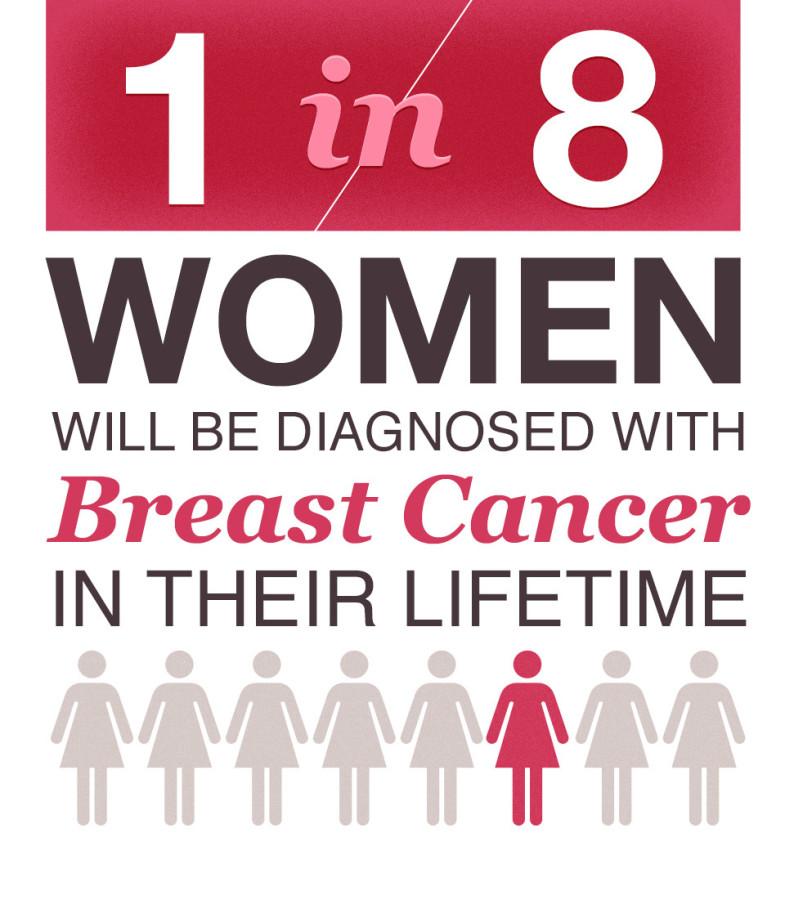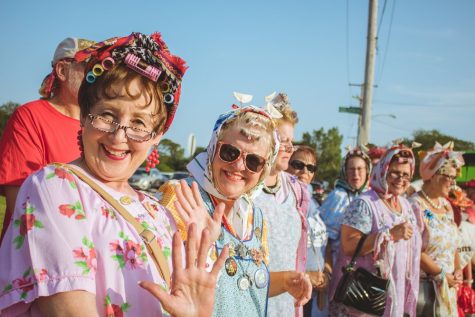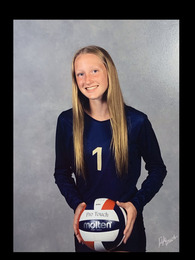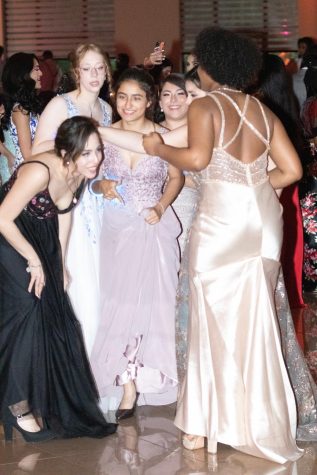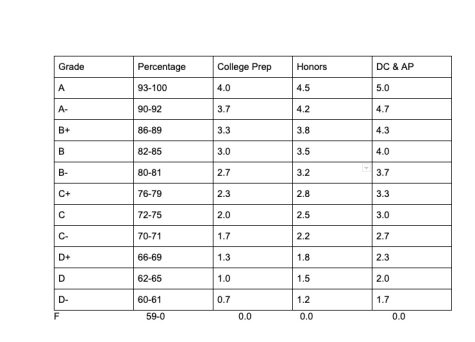Redefining Awareness
October 29, 2015
It was late July of 2011 when everything changed for 46-year old Sheila Blanco.
But despite of that, it was summer. School wouldn’t be starting for another few weeks. There was still time for 12-year old Katie (now a junior at Bishop Noll) and 8-year old Carli to enjoy their summer vacation. The weather was warm and the green leaves of the trees swayed with the breeze. The leaves whispered together, creating a beautiful song that caused the birds to sing along with the melody.
She came home from work on that hot summer day, hearing the voice message on her machine from her doctor. He had asked her to call him back. In that moment, a sharp feeling flung in her chest. She knew. It was bad news and she knew it. There was nothing she could do but call.
So she did. She called him with her heart thumping. Then he answered. He said the words that no one would want to hear.
Sheila Blanco had breast cancer driven by hormones–the most common type–and was at stage 2. The news gnawed at Sheila’s heart. It clawed and punched and scratched until she broke.
“At that point, you don’t even know what questions to ask, so you just cry,” she said.
However, despite her having cancer, she was one of the lucky ones. Her doctor told her that her cancer was caught early and could be treated. He gave her the 10 digit number to an oncologist. He wanted her to see him right away. But then a thought popped in her mind–The kids! Disney World!–and she asked if a week would make a difference, that in four days, her family was to fly to Florida to take a vacation to Disney World.
The doctor told her it was her choice.
Sheila hung up the phone and waited in her room. She took deep breaths, wiping away the warm tears that slid down her cheeks.
How was she going to tell them? How was she going to tell Katie and Carli–her daughters–that she, their mom, had breast cancer? How was she going to tell Dave–her husband–that she had the disease that killed his mother? How could anyone have the strength to do that? How could anyone have the strength to tell their loved ones that they have breast cancer?
Breast cancer has this special talent of sneaking into people’s lives and then either stealing it away in a blink of an eye or causing quite a scare and an emotional cleanup. It does it so quickly, so silently–almost like a snake slithering on the cold ground to attack its prey–that the public is sometimes oblivious to it because it is so silent. And even though October is Breast Cancer Awareness Month, it comes to light that many people are never prepared for the consequences and some aren’t truly aware of the severity of the disease: One in eight women will develop invasive breast cancer over the course of her lifetime; besides lung cancer, it is the most deadly type of cancer; women with a close relative who was stricken with the disease are twice as likely to contract it; and while most common in women over 45, anyone can be stricken with breast cancer—young girls and men included. Other risk factors include genes that increase cancer risk (BRCA1 and BRCA2), radiation exposure, obesity, taking hormone therapy medications, smoking, and drinking alcohol.
Sheila eventually found the strength she needed and she came out of her bedroom. She found Katie and Carli. She told them the news and the moment the malicious news traveled out of her mouth like a snake filled with venom, the three of them hugged each other. Their tears and arms stayed intertwined, becoming one.
“I told them that I would fight this and be fine.”And Sheila was going to fight this and be fine. She could do it. She had to be okay in the end–right? Right?
Sheila knew that her husband Dave had to hear of the news as well. But there was a problem. At the time, Dave was in the middle of escorting President Obama during his visit in Chicago. He was the Commanding Officer at the Traffic Unit, and would not be able to call home. But Sheila tried anyways, knowing that he needed to know. It was important for him to know.
Sheila got a hold of Dave, telling him the news. Dave wanted to come home to her to be with her and the girls. Sheila took a brave, deep breath and told him she was fine and to finish escorting the president. He was reluctant, but he agreed nonetheless. It hurt, knowing that breast cancer killed his mother and it was now something his wife battled, too.
“Breast cancer is something the whole family goes through,” Sheila said. “Sometimes the patient has to help support the rest of the family.”
One of the challenges that comes along with breast cancer is learning to survive with it–for both the patient and the family members.
Mr. Mark Miller, math teacher at Bishop Noll Institute, understands how vicious this disease is. Both Miller’s mom and aunt were diagnosed with breast cancer. His aunt was diagnosed in June of 2005 at 43-years old and his mom was diagnosed just two months after Miller’s aunt was diagnosed in August of 2005 at the age of 48. Miller said he was filled with shock. Both his mom and aunt were fairly young when they were diagnosed and their diagnoses were so close to each other. There was no time to cope.
“I tried very hard not to let it affect me. That is what my mom wanted. She had a good prognosis and a very positive attitude about the whole thing. That made it much easier to deal with,” he said. “She wasn’t going to let it affect her daily life and she didn’t want any of her family to be burdened by anything she was going through.”
Like Miller, Katie tried to not let her mother’s sickness affect her. But through coping with the pain of loving someone with a serious disease, Katie found herself often losing faith.
“It was very hard to live with knowing your mom has breast cancer,” Katie said.
Katie had to be strong for not only herself, but for her mom and her little sister–both who she loved dearly. But despite of being strong, life wasn’t getting an easier to live. Katie felt sad, alone, and believed no one would understand or care. So, she did what she thought was best. She kept it to herself.
“Sometimes I would write down how I felt and throw what I wrote away after. Mostly I just had to live with it, even though it was hard,” she said.
But despite of it being hard, the Blanco family and the Miller family would never give up. They stayed strong and invincible and loving. Katie, Carli, and Dave would do anything they could for Sheila–and Sheila would do anything she could for them. They would save each other. Miller would constantly volunteer to help his mother and aunt, but always had a guilty feeling gnawing at him.
“I always felt like I didn’t do enough, but sometimes there is nothing you can do other than to be with them as they were going through difficult times,” he said.
Battling through the treatments is another challenge altogether. Chemotherapy can be done either before a mastectomy or after it and can take several months of treatments, often with very little recovery time in between.
Sheila’s treatment began on Sept. 1, 2011.
It hit with a bang, starting with a right side mastectomy (the surgical removal of one or both breasts partially or completely). The surgeon believed that in Sheila’s breast there were two different locations of cancer. So, the surgeon removed the lymph nodes under her right arm and tested them for cancer.
Miraculously, the test results came back clear.
Then a month swooshed by. Sheila’s first chemo treatment began.
“That was very emotional for me. I just sat there and cried as they put the needle in me. It took 15 minutes and I finally relaxed and accepted it,” she said.
And really in the end, when there is nothing we can do, we must accept.
Despite the first treatment being tortuous, the next five were easier. Sheila was called the “gadget lady”. She always had her work phone and tablet with her. Since she is a hard and determined worker, she worked on something while she had her chemo. She wanted life to be normal.
“My mom went to work almost everyday and when she didn’t she worked at home,” Katie explained, revealing her mom’s strength and ambition that pumped in her heart.
Sheila is the purchasing manager for a food distributor (A New Dairy) and her job is to buy all the food that her company sells to the restaurants, hotels, country clubs, and hospitals.
“She was so strong during that time. She could have taken off work, but she wanted her life to be fairly normal. That was one thing that while having cancer she really wanted, just for life to be as normal as possible.”
And Sheila made sure that life continued to be somewhat normal.
Miller’s mom made sure that life continued to be somewhat normal as well.
“After [my mom] started undergoing treatments and I was able to see how she was responding, I started to feel better about the whole thing. My mom continued to work and go about her normal everyday life while she was undergoing treatment. The doctors were also very optimistic about the outcome so that helped to lessen my fears as well.”
And in these cases, optimism is the key.
Breast Cancer is part of the norm now, so why not just accept it? It is okay to be comfortable with it. That is what Sheila wanted.
“I always thought it was funny when you told someone face to face, the first thing they would do [during chemo] was to look at your breast,” Sheila said, “I would joke about that and that helped break the ice.”
Sheila continued to spread her positivity at the hospital, where she spent her time talking with other patients, while Katie, Carli, and Dave stayed loyal to Sheila, taking care of her in the best ways that they could. They helped around the house and made sure that Sheila was comfortable and happy. Dave, who used to work 12-15 hours a day, now only works 8 hours, spending more time with his daughters and wife.
“Sometimes it takes something like this to make you realize what is important,” Sheila said.
As for Miller and his family, his mom has been cancer free for several years now. However, his aunt’s cancer spread and she passed away just last month.
But despite of the struggles of Miller losing his aunt and the struggles that the Blanco family faced, they are survivors and they believe that everyone else who knows someone or is someone who is facing cancer can survive too.
“There are tons of people who went through the same thing,” Katie explained. “Of course no one experiences the same thing. It is easier to talk to someone who knows how it feels. I wish I would have known someone who went through the same thing. It is easier to talk to people than to keep your feelings buried inside.”
Miller agrees.
“The most important thing is that it is NOT a death sentence. If caught early, it is very treatable. A positive attitude is key.”
What worked for the Blanco family and Miller’s family was to stay positive. But just because the rain lifted doesn’t mean that the fear of cancer isn’t there. Katie and Sheila are concerned and nervous about the likelihood of Katie or Carli contracting the cancer since both their mother and grandmother had it. Eleven-percent of young women (under the age of 40) will be diagnosed with breast cancer this year.
Miller never thought about himself getting breast cancer, but it is possible. One in 1,000 men will develop breast cancer this year. Both men and women need to understand the risks and what to do to reduce the risk of cancer: avoid alcohol and smoking, control your weight, be physically active, and avoid exposure to radiation and environmental pollution.
“Know your body and you will know when something does not seem right. That is when you need to go to the doctor,” Sheila said. “Early detection is critical. I talk to my daughters about it and tell them that it will be important for them to start mammograms early in life.”
Both Miller and the Blanco family can’t stress enough how much men and women need to be aware of the risk and severity of breast cancer.
“I know some people wear pink ribbon as a symbol and I love the idea of that,” Katie said, “but I think it is hard for people to really understand the meaning of the ribbon. Wearing it is one thing, but knowing what it symbolizes is another.”
Breast cancer can affect everyone and anyone at the drop of a hat. Sheila never thought she could get breast cancer, but she did. She took the time to go have her yearly tests, just in case. She doesn’t believe there is a right or wrong choice, but people need to look at every option there is and listen to the doctor.
“For me, I always went with my gut feelings. I have no regrets on deciding to go with a mastectomy and reconstructive surgery.”

